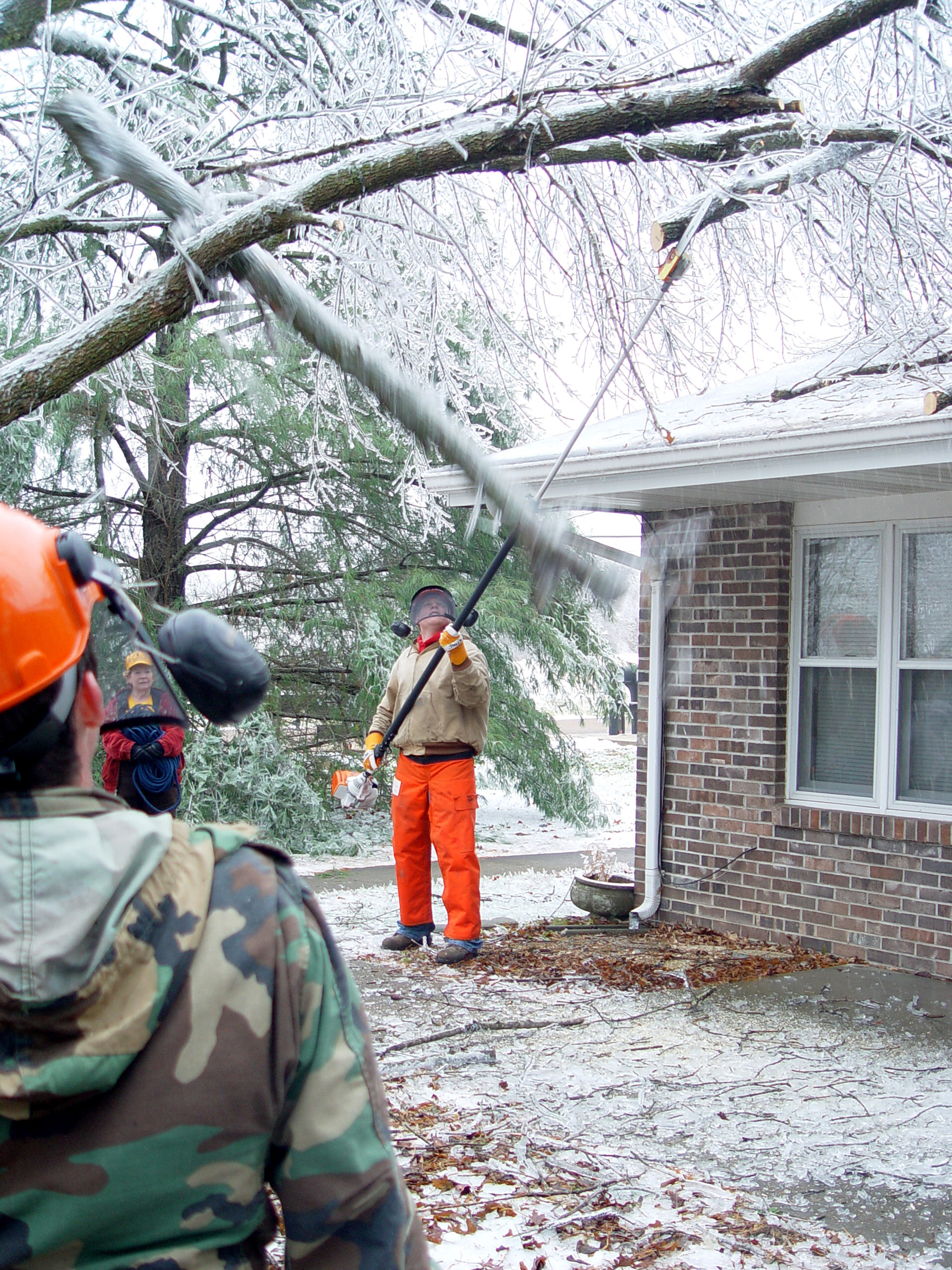
RUSSELLVILLE, Mo. (BP)–The dual ice storms that hit the Midwest starting Dec. 9 were too much for trees and power lines in much of the region, leaving millions of people from Oklahoma to Wisconsin in the dark and cold.
Oklahoma, Kansas, and Missouri have been declared federal disaster areas and at least 26 people have died as a result of the storms, most due to weather-related traffic accidents.
Even as the sleet and freezing was still falling, Southern Baptist disaster relief workers from Missouri and other states were gearing up to remove fallen trees and feed the hungry.
“It’s a massive workload,” said Danny Decker, disaster relief coordinator for the Missouri Baptist Convention.
Chainsaw teams are pulling limbs off houses and power lines and clearing sidewalks across the state, he said. The hardest hit areas are around Joplin near the Oklahoma line, five counties surrounding Jefferson City in central Missouri and 13 counties around St. Joseph in the northwest corner of the state.
A mass care feeding unit from the Missouri Baptist Convention has been sent to St. Joseph. Although much of the state’s power has been restored, some 30,000 people remain without power in the St. Joseph area; roughly 10,000 around Joplin; and more than 5,000 in central Missouri.
In Oklahoma, some 400,000 homes remain without electricity — down from 600,000 earlier this week, which was about one-third of Oklahoma’s population.
Sam Porter, disaster relief director for the Baptist General Convention of Oklahoma, has established command centers in Oklahoma City and Tulsa for some 30 chainsaw teams.
“We have 10 chainsaw teams already on the ground,” Porter said. “We’ve asked for 20 more crews, and the other state associations are really rallying to help us. We already have seven crews coming from Texas, one from Virginia, six from Tennessee and one from Louisiana.”
Porter said his objective is to finish priority work by Christmas. Such work includes downed-tree relief for the elderly and disabled, and trees removed from houses, driveways, walkways and cars.
Southern Baptist feeding units are serving 18 shelters in Oklahoma City and Tulsa, the two major metro areas affected by the ice storms. A feeding unit at Ridgeway Baptist Church in Sapulpa is serving shelters in west Tulsa, while a unit at Arrow Heights Baptist Church in Broken Arrow is providing meals to those in east Tulsa.
Missouri Gov. Matt Blunt, a member of Second Baptist Church in Springfield, has mobilized the National Guard to St. Joseph to help identify residents in need. Churches in those hard-hit areas have opened their doors as shelters to those without power and to disaster relief workers.
By Thursday afternoon, crews had completed 13 chainsaw jobs, served 139 meals, provided 31 showers and presented the Gospel eight times in Missouri. Decker said six Missouri chainsaw teams are now at work, bringing the total to 54 disaster relief volunteers in the state. That number will soon rise as chainsaw crews from Baptist conventions in Mississippi, Arkansas, Illinois, Ohio and Alabama arrive in Missouri.
David Wells, who normally leads the Jefferson Baptist Association shower unit based south of St. Louis, grabbed his blue hat and a chainsaw Wednesday morning and headed for the tiny town of Russellville, about 20 minutes west of Jefferson City.
“The power companies have done a lot, but there are still entire trees on houses around here,” he said as his crew cleared the sidewalk and porch ramp of an elderly woman in a wheelchair. “Things look pretty rough.”
Decker, Wells and the other disaster relief volunteers are no stranger to ice storms. They cleared debris last January around Springfield for six weeks. At the time, disaster relief officials described it as the worst natural disaster in the United States since Hurricane Katrina struck the Gulf Coast in 2005. According to Decker, this storm’s devastation is more widespread.
“The amount of ice per tree is not as heavy,” he said, “but the overall magnitude of it is just as bad. It has covered the state from I-44 north to the Iowa line and from Kansas to Illinois.”
Decker said he is unsure how long the disaster relief workers will be on the job.
“It’s still up in the air,” he said. “It really depends on the weather.”
The National Weather Service predicts the state will be cold but precipitation-free until Saturday, but the forecast calls for three inches of snow in central Missouri over the weekend. Hard-hit St. Joseph is expecting just one inch of snow and Joplin four to six inches. While the snow may slow current cleanup efforts, it isn’t likely to cause more power outages or take down more trees.
The cost of the ice storm cleanup is unknown at this time. Aside from prayers and more volunteers, Decker said donations designated for disaster relief can be sent to the Baptist Building at 400 E. High St., Jefferson City, MO 65101. To volunteer, call Gwen Martin at 573-636-0400, ext. 631, or 1-800-736-6227, ext. 631.
Donations to the broader disaster relief effort may be made by sending checks to the North American Mission Board’s Disaster Relief Fund, P.O. Box 116543, Atlanta, GA 30368.
–30–
Brian Koonce is a staff writer for The Pathway, official newsjournal of the Missouri Baptist Convention; Mickey Noah is a writer for the North American Mission Board.
















